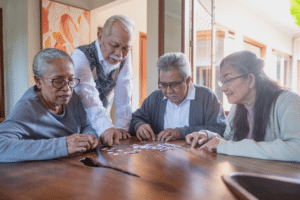As we grow older, most of us wish to exit this world as peacefully as possible.
Image source: Suriya Donavanik via wikimedia.org
My grandfather passed away from cancer in his eighties, leaving behind my grandmother who went on to live a few years longer. After his death, I remember my grandmother repeatedly saying, “I wish I had gone first. I don’t want to be around without him.” And that was before her health had deteriorated to the point of unremitting pain. It was incredibly difficult to watch the woman whom I knew to be sophisticated and highly intelligent slowly lose her ability to function. As her eyes became blind and osteoporosis took hold of her ability to move, I watched as the light faded from her soul. She was still here… and yet she wasn’t.
She did not want to be here anymore.
Reasons for aid in dying
Had the option of aid in dying been presented to her, I’m not sure if she would’ve taken it. But I do know that she would have, at least, strongly considered it. It can be difficult to speak about aid in dying, as it can raise feelings of loss and helplessness. We can no longer turn away from our own mortality, nor that of our loved ones. And yet, as an integral part of the end-of-life choice movement, aid in dying grants people freedom. After all, everyone deserves to have control over their own life.
There are various reasons why a person would opt for aid in dying as opposed to waiting for death to naturally occur. These include avoiding pain, belaboring family members with care taking, and being left in isolation:
“The top concern of the dying is that they do not want to be in pain – then that they do not want to be a burden and thirdly, that they do not want to be alone. The first and last of those are sometimes hard to achieve.”
One of the arguments used against aid in dying is that pain control can be achieved with drugs. However, even with modern medicine, this is not entirely true: “studies show [pain relief] is complete in only 60-70% of cases. There are neurological pains and bone pains when people are dying that are hard to relieve.”
Sandra Bem’s story
Loss of control, dignity, and mental faculties also contribute to the desire to die sooner. Sandra Bem’s story, as shared eloquently by NPR, demonstrates what can happen when a person says no to impending dementia. After being diagnosed with Alzheimer’s disease, Bem — a respected scholar and psychologist — made the choice to end her life as soon as her condition deteriorated enough to warrant it, but while she was still physically able to administer the lethal dose of drugs herself. For the highly academic Bem, the idea of no longer being able to “read, write and recognize people” was not a fate she wanted to endure. She shared this decision openly with her family and friends, to the point where her daughter even grew tired of always talking about it. This enabled Bem’s loved ones to hold a gathering to honor her life a week before her death, which helped them manage the subsequent grief.
Considering all options
This stands in contrast to the common misconception that aid in dying hurts friends and family members most of all. However, like Bem’s case, there is evidence to the contrary. A recent survey that assessed “depression, complicated grief and other psychological measures in survivors found that the relatives of people who choose [aid in dying] did slightly better.”
That Bem chose to include her friends and family in her plan to end her life played a large role in their own ability to deal with their grief. Aid in dying can also relieve people from having to watch their loved ones suffer physical and emotional pain unnecessarily, as in my own experience with my grandmother. Of course, when it comes to end-of-life choices, what feels right for one person may not be true for another.
What is clear is that sharing stories like Sandra Bem’s can increase our understanding of this deeply personal issue, as well as our ability to empathize with those who might feel, and choose, differently than us. By communicating compassionately about this inherently sensitive and subjective topic, we can move forward with the conversation, and do our best to support others in their quest to attain peace in old age.
The issue of aid in dying is complicated, and nothing that should be taken lightly. Our staff understands the needs, fears, and anxieties of the elderly, and are on-hand to help you through difficult times. For more information, please contact the Institute on Aging today.







